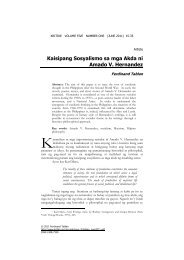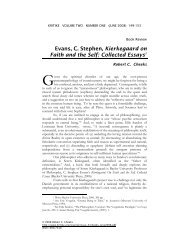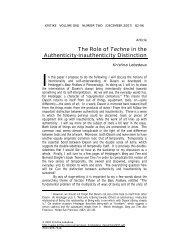The Paradox of Ipseity and Difference: Derrida's Deconstruction and ...
The Paradox of Ipseity and Difference: Derrida's Deconstruction and ...
The Paradox of Ipseity and Difference: Derrida's Deconstruction and ...
You also want an ePaper? Increase the reach of your titles
YUMPU automatically turns print PDFs into web optimized ePapers that Google loves.
40 THE PARADOX OF IPSEITY AND DIFFERENCE<br />
effective, nor can they take accurate aim, except by<br />
inhabiting those structures. Inhabiting them in a certain way,<br />
because one always inhabits, <strong>and</strong> all the more when one<br />
does not suspect it. Operating necessarily from the inside,<br />
borrowing all the strategic <strong>and</strong> economic resources <strong>of</strong><br />
subversion from the old structure, borrowing them<br />
structurally, that is to say without being able to isolate<br />
their elements <strong>and</strong> atoms, the enterprise <strong>of</strong><br />
deconstruction always in a certain way falls prey to its own<br />
work. This is what the person who has begun the same<br />
work in another area <strong>of</strong> the same habitation does not fail<br />
to point out with zeal. No exercise is more widespread<br />
today <strong>and</strong> one should be able to formalize its rules. 35<br />
To recall the earlier distinctions made on logocentrism, Derrida<br />
indirectly implies the problem that is incurred within the notion <strong>of</strong><br />
logocentrism itself. For on one h<strong>and</strong>, the unconscious or the passive way <strong>of</strong><br />
inhabiting the text occurs as a zealous way <strong>of</strong> asserting a formal <strong>and</strong> pure sense<br />
<strong>of</strong> meaning that the text manifests; on the other h<strong>and</strong>, the active sense <strong>of</strong><br />
logocentrism sees logocentrism as an invitation to inhabit the text for what it<br />
has to manifest, excluding, for the mean time, the imposed canonical notions<br />
<strong>of</strong> how the text itself should operate. <strong>The</strong> problem with logocentrism, as I<br />
have mentioned earlier, is that it is a mere supplementation <strong>of</strong> a lost presence, <strong>and</strong><br />
in dealing with this eccentric center, one does not actually know the totality <strong>of</strong><br />
the intention <strong>of</strong> what the text tries to manifest towards its recipient (be it<br />
towards an intended recipient or not).<br />
As a consequence <strong>of</strong> convenience, language creates this problem <strong>of</strong><br />
giving the center the character <strong>of</strong> permanence, viz., the written logos. <strong>The</strong><br />
center, moreover, is always already differing from itself upon its inscription.<br />
History, for example, is problematic, because the experience <strong>and</strong> the<br />
inscription <strong>of</strong> the events in time are unique in their appropriation; 36 thus, there<br />
is a difference between the historian’s experience <strong>of</strong> an actual event (based on<br />
this very own account) <strong>and</strong> what his readers would underst<strong>and</strong> from the same<br />
account. Thus, one will see that the logos is double-edged, it conveys the no<br />
longer present for the convenience <strong>of</strong> others who were not there, while, at the<br />
same time, it obfuscates the account <strong>of</strong> presence that was once there. In Derrida’s<br />
reading <strong>of</strong> Plato in Dissemination, Derrida would agree with Plato’s notion <strong>of</strong><br />
writing as a supplement or as a pharmakon. 37 As a supplement introduced to the<br />
35 Ibid., 24.<br />
36 Ibid., 20.<br />
37 “<strong>The</strong>re is certainly play in such a movement, <strong>and</strong> this chiasmus is authorized, even<br />
prescribed, by the ambivalence <strong>of</strong> the pharmakon. Not only by the polarity good/evil, but by the<br />
double participation in the distinct regions <strong>of</strong> the soul <strong>and</strong> the body, the invisible <strong>and</strong> the visible.<br />
This double participation, once again, does not mix together two previously separate elements; it<br />
refers back to a same that is not the identical, to the common element or medium <strong>of</strong> any possible<br />
dissociation.” Derrida, Dissemination, 127.
















